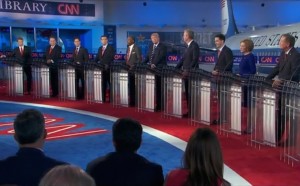The Second Republican Debate: War, Women’s Health, and Religious Favoritism
 Screengrab via CNN
Screengrab via CNN I really didn’t want to watch the second Republican debate and not because I’m uninterested in politics; in fact, politics is my profession and greatest personal interest. But televised debates, regardless of which party is participating, tend to show the worst of American democracy. Rather than making nuanced arguments about public policy, candidates tend to lob personal attacks or tell pointless folksy stories that they hope will endear them to the general public.
So rather than sit at home in front of my television, I went out to a local bar with some friends last night instead. But as I walked up to the bar to order a drink, I noticed that the debate was on every television screen—this is DC, after all. Like a moth to a flame, I was drawn in.
While this debate was less antagonistic than the one that preceded it, I was amazed by the focus of this event. Rather than discussing the thirty million Americans who are uninsured, the candidates focused on defunding Planned Parenthood, depriving countless Americans of the important medical services that the organization provides. Even Governor John Kasich, who is seen by many as a moderate alternative in an increasingly conservative field, said that he would support defunding Planned Parenthood and claimed that he doesn’t know anyone who thinks that the organization should keep their federal funding.
And rather than discussing a way to fix the poverty epidemic in America, the candidates discussed how we need to spend more money on the military and how we need to be involved in more conflicts so as to assert American dominance and power.
None of this was especially surprising given the current legislative focus of the GOP, which is beholden to the religious right and special interests that push war while neglecting the problems here at home.
But it was especially disappointing to see elected government officials discuss ways in which they could undermine democratic government and the rule of law by granting special rights to Christians who feel that their faith is more important than the laws of the land. Former Governor Mike Huckabee said, in reference to county clerk Kim Davis and her calls for a religious accommodation, “We made an accommodation to the Fort Hood shooter to let him grow a beard. We made accommodations to the detainees at Gitmo—I’ve been to Gitmo, and I’ve seen the accommodations that we made to the Muslim detainees who killed Americans. You’re telling me that you cannot make an accommodation for an elected Democrat county clerk from Rowan County, Kentucky? What else is it other than the criminalization of her faith and the exaltation of the faith of everyone else who might be a Fort Hood shooter or a detainee at Gitmo?”
Even more concerning was the backtracking by former Governor Jeb Bush, who initially stated that Kim Davis is “sworn to uphold the law” and should allow gay couples to get married. But last night, Bush seemed to change his mind, stating, “I think there needs to be accommodation for someone acting on faith. Religious conscience is a first freedom. It’s a powerful part of our Bill of Rights… there should be some accommodation for her conscience, just as there should be for people that are florists that don’t want to participate in weddings, or bakers.”
It says something about the GOP when the most concerning aspect of the debate wasn’t the arrogance of Donald Trump, but the disconnect between the policies of the candidates and the priorities of voters. While it’s well-known that members of both parties tend to be more extreme in their positions before the primaries to shore up their base, the compassionless arguments made by most of the candidates on stage suggest that the party is more concerned with projecting a strong image than helping those in need. Perhaps this will change as the election draws closer and as both parties seek to win over independents. But I’m not holding my breath.
